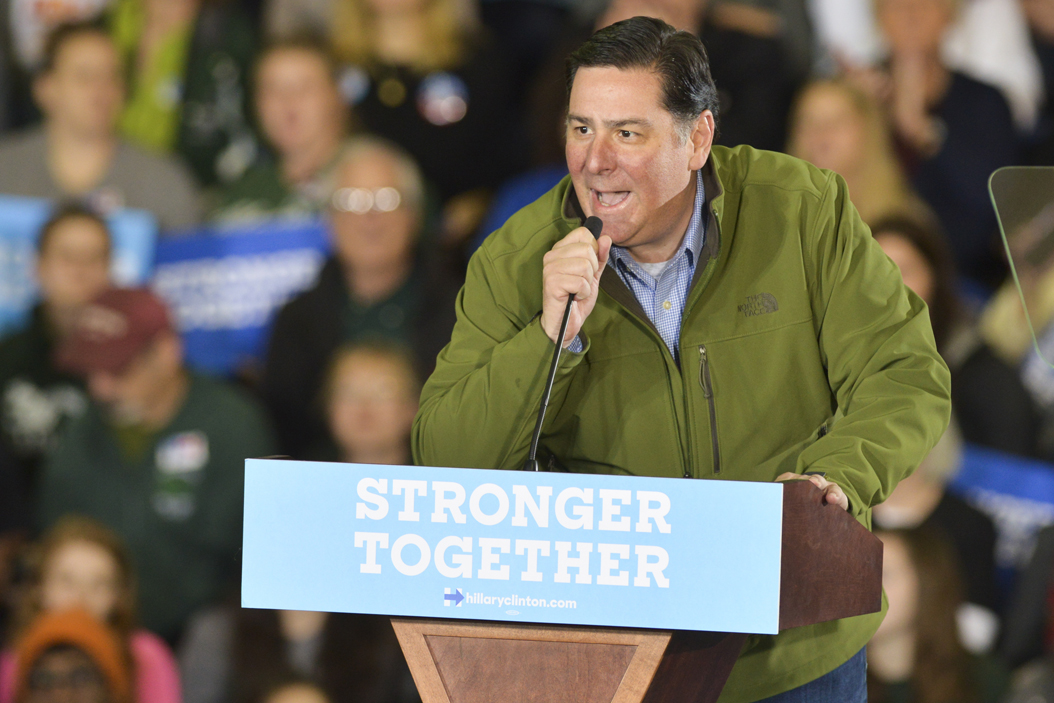Editorial: Peduto should live up to campaign finance promises


Pittsburgh mayor Bill Peduto speaks before a Hillary Clinton rally at Taylor Allderdice High School on October 22, 2016. Stephen Caruso|Online Visual Editor
When Pittsburgh Mayor Bill Peduto first threw his support behind campaign finance reform, he was ahead of his time. Now the story’s a little different.
Years before the Supreme Court’s “Citizens United” decision and the campaigns of politicians such as Sen. Bernie Sanders (I-Vt.) made it a top-tier issue, Bill Peduto used his position in the Pittsburgh City Council to reform the way private entities and individuals could give to political campaigns in the city. In the build-up to the 2009 mayoral election, Peduto called then-mayor Luke Ravenstahl “naive” for his insistence that large campaign contributions had no effect on how he would act in office.
Peduto’s efforts in 2009 led to the city’s first-ever limitation on donations to political campaigns with a new law that capped individual contributions at $2,000. In the 2013 mayoral race — the first to make use of these rules — Peduto raised funds from what he called “one of the broadest bases of political support in all of Western Pennsylvania” to win his first term in office.
Yet now, with an unopposed re-election bid in his sights, Peduto and his chief of staff, Kevin Acklin, appear to be the naive ones. The Pittsburgh Post-Gazette reported Sunday that both men had made fundraising calls to multiple sources with business before the city, including realty company Walnut Capital and Chicago-based land developer Dan McCaffery.
Acklin, who also heads the city’s Urban Redevelopment Authority, made phone calls to more than half — 12 out of 23 — of the firms who have or had contracts with the city in the past year. And while Acklin insists the conversations avoided the topic of city business, statewide good-government advocacy groups like Common Cause Pennsylvania maintain that the situation gives rise for concern regardless.
Regardless of intent, politicians have “life-or-death powers over the projects that these developers are pursuing,” Bob Warner, vice chair for issues at Common Cause, told the Post-Gazette.
Because of the formal separation of fundraising from city business, it doesn’t seem that any laws regulating campaign fundraising have been broken. But, in a city that as recently as 2008 had no limits on campaign contributions and continues to have some of the most lenient fundraising regulations of any major city in the nation, that isn’t saying much.
The mayor must prove once again that he is truly committed to running a clean government and abandon the quid-pro-quo gamesmanship of cashing in on business clients. With campaign finance a long-term priority of Peduto’s political career, Pittsburgh deserves a responsibly financed campaign and an honest explanation from its mayor.
Recent Posts
Therese Pitman: Giving back to Pitt’s student-athletes with equality
Pitman is Pitt’s Director of Student Athlete Development where she helps student-athletes navigate their career…
Pitt speech and debate team heads to nationals
The William Pitt Debating Union, Pitt’s speech and debate team, sends students to both in-person…
Visuals: A Year in Review
The visuals desk had an interesting year. In the midst of the 2024 Presidential Election,…
De-stress events across campus offer students a break from studying
During finals week, departments across campus are offering wellness events to help students manage stress…
Pitt students share their summer plans
After a long and strenuous academic year, many students are excited to take a break.…
Column | Collaboration and connection make us better — yes, even in journalism
Today is the last day I will ever do this, and despite the amount of…


